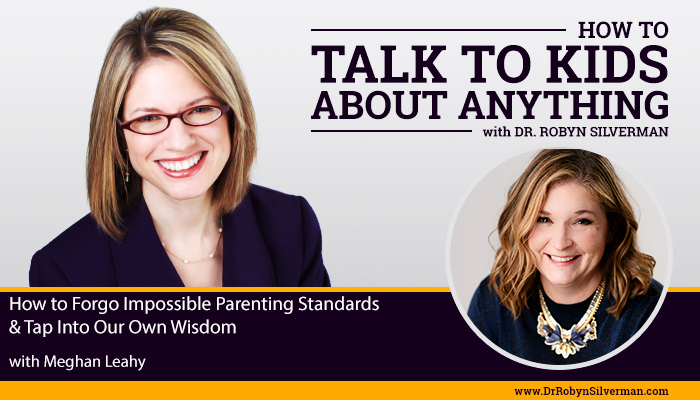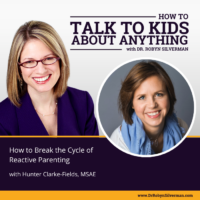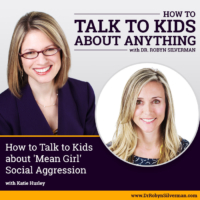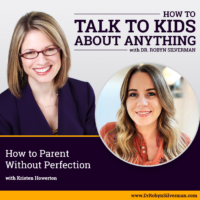Podcast: Play in new window | Download
Subscribe: Apple Podcasts | RSS | More
How to Forego Impossible Parenting Standards & Tap into Our Own Wisdom

This podcast will focus on how parents can get away from the pressures of perfectionism and the rules of what they “have to do” as parents. Mothers and fathers need to learn how to parent outside of the lines, tap into their own wisdom and connect with their child in order for their families to thrive. Forget helicopter parenting, tiger moms, positive parenting or being mindful in the middle of a meltdown and instead discover relatable ways to stay connected to your kids.
Guest Expert: Meghan Leahy
Have you ever felt overwhelmed by the stress and perfectionism of our overparenting  culture–and at the same time, yearned for solutions to ease the struggles of everyday family life? Perhaps you have been caught at the grocery store with a tantruming 2-year-old, made organic salmon for your 4-year-old only to have it thrown across the room or attempted to reason with your 5-year-old about why you should stay at the party so you could have some “adult-time” after they were more than an hour past done, done? We hear about the endless “shoulds” of modern parenting– and yet real life just needs real solutions. Today, we are going to discuss how we can parent outside of the lines with guest, Meghan Leahy.
culture–and at the same time, yearned for solutions to ease the struggles of everyday family life? Perhaps you have been caught at the grocery store with a tantruming 2-year-old, made organic salmon for your 4-year-old only to have it thrown across the room or attempted to reason with your 5-year-old about why you should stay at the party so you could have some “adult-time” after they were more than an hour past done, done? We hear about the endless “shoulds” of modern parenting– and yet real life just needs real solutions. Today, we are going to discuss how we can parent outside of the lines with guest, Meghan Leahy.
Meghan Leahy is the On Parenting columnist for The Washington Post, and a certified parenting coach. She is the author of PARENTING OUTSIDE THE LINES and is the mother of three daughters. She practices Zen Buddhism, holds a bachelor’s degree in English and secondary education and a master’s degree in school counseling. She has appeared on NPR, ABC and in numerous other publications. Leahy lives with her family outside Washington DC.
Important Messages:
- Any kind of effective parenting is done while acknowledging own reactions. Have to
 understand themselves. When we don’t understand ourselves or what motivates themselves, that’s what trips us up. It’s not the strategies.
understand themselves. When we don’t understand ourselves or what motivates themselves, that’s what trips us up. It’s not the strategies. - We tell ourselves lies that can get us into trouble- “I’m just running in,” “We’re only stopping by…”
- You can be completely prepared and great conditions and still have a nightmare trip to the grocery store. That’s when you think of another way.
- A bribe can get you through a hard pickle. Not if you use it all the time, but when you really need it.
- When you become a parent, everything gets revealed as working or not working.
- Might feel like- what’s wrong with me? I’m doing all the things!
- Even though you might have all the education- when you love your child, you can’t access that part of your rational brain.
- Everyone is self-absorbed- nobody is looking at you!
- Kids will get older- and more mature. It takes over time.
- Sometimes we out pressures on our kids that are unneeded. Don’t create a fight with your child. For example, making them get out of their pajamas to get into “big girl” clothes when they are kind of the same.
- What are we paying attention to right now?
- Questions: Do the pajamas make her feel comfortable and safe? Is that relationship affirmative? Step back and see what’s good.
- They mature- and by giving them the choice when they are young, they typically move to making the right choice later on.
- Question yourself when you see a behavior. For example, the worst Saturday. Resonating in your parenting heart as fear and failure on an epic level. Might just be a bad day.
- Pick apart a pattern.
- The 3 year old- when you give a string of directions, can’t follow. Or giving 12 year old commands- and they are too old for this.
- We go down the rabbit hole of why a child won’t brush teeth when it’s really about independence.
- Don’t awfulize everything. “Everyday’s a crap day! These kids are always bad! I’m a terrible parent!” Actually, it’s just 4pm that sucks!
- Find the silver linings.
- Lots of corrections. Stop, don’t. When is the last time you highlighted or praised or found the good of your family? Must find the strengths! Nobody wakes up and intends to make life hard for their family. We do a lot of habitual thinking. We become the hammer and the kids become the nail. And we wait for the nail to change. Pattern of suffering.
- Need to pivot and step back. Sometimes, if a child has executive functioning issues, people try to push positive parenting techniques but that doesn’t work. They need rewards. You push those rewards on a neuro-typical kid and it’s a disaster. Studies are clear that rewards can have a negative consequence with neuro-typical kids.
- Sibling- Did you create competition? Scapegoating? Did you make one in charge of the other? Are they hungry? Are you feeling like they need to fight it out?
- Script: NOT “I need you to be kinder to your sister.” Instead “Gosh, being a big sister sucks sometimes. Your siblings can be enormous pains in the butt sometimes!” Flicker of recognition. I get you. Mom or Dad gets me. Then they can tell you what’s on their heart. It’s a safe place to vent.
- Family meetings work- but sometimes you need one on one.
- Unpacking of pain- resentment, trust broken, takes a long time. We want this to be quick. “Thank you, received.” No. Sometimes the walls around a child’s hear are thick. And if you bulldoze them they strengthen. Continue to show up. Compasison. Non judgement. Works.
- It needs to be compassion AND strength. “Having a little brother can suck AND I’m not going to allow you to beat the crap out of him.” Be consistent. Need the boundaries. Awaken. Everyone wants a result quickly. And it hits the nerves.
- Fall out of pose with grace. Fall out of parenting with grace. This is what good parents and good leaders do. That’s what a parent is- a leader of their family. So- your child wants a popsicle- you might decide to change your mind and say; “Yes, this is a good idea.” Don’t get passive aggressive or be so focused on rules you can’t pivot.
- Happy is not a state of being- it’s a mood. We want our kids to experience a full range of appropriate emotions.”
- Parents often hold onto rules too far.
- Must learn to apologize. Make mistakes. Try again.
- Drive by parenting- yell from the other room. Teach child to yell for you. Quiet person- you had to go to him. Your parents teach you how to treat them.
- Engaging with your child- create a routine- then you can play legos. Yelling commands at a child’s head is not going to change a child’s behavior.
- When you think of the way you engage with your child- if you took that behavior into the workplace or with your friends- is it unacceptable? If you were being filmed?
- Parenting is completely generalized and utterly specific. Instead of constantly looking for the next strategy, continue to ask yourself thoughtful questions. What is this really about? What is really happening here? What are my triggers? What is my part in this? When do I need extra help? When have I been testing? How do I understand this child? You might not know. Sometimes being in the dark is parenting. You don’t know what’s right until we’re through it.
Notable Quotables:
- “We invite situations with children, who are already immature, and have trouble communicating with us, that are not going to end well…and then we can’t believe they don’t end well!
- “You can do everything right. You can bring a well-rested, well-fed, happy child to the grocery store. You can have lollipops in your bag and a song in your heart. You can go at 6am when no one is there and have it all go south. Unless you are buying groceries and your life is depending on it, you have to access the needs of the situation. You can ask a friend to run to the store, you can have groceries delivered and you can always, always leave the cart.”
- “I was an excellent baby mother. My child was the question and I was the answer.”
- “I was living out my insecurities on my child, which was bad enough, but I had created huge problems that have morphed into far more than clothes. It was mine to undo. Parents are waiting for kids to be better. That’s crazy.”
- “Don’t create a fight with your child. Don’t water the weeds or pay attention to what doesn’t work.”
- Parenting through pajamas and parenting through a kid telling you who they are when they are older are the same. It has to do with it not always being about me.”
- “When you are in the middle of your worst Saturday and it’s resonating in your parenting heart as fear and failure on an epic level, ask yourself these questions. Does it happen every Saturday? Does it happen every other Saturday? Does it happen every third Saturday? No? Then it was just a bad day.”
- “Do you keep expecting your children to solve the problem when it clear that developmentally, they can not? Do you have unreasonable expectations of what your children can handle?”
- “Sometimes we have a pattern in which a child is telling you who they are and you aren’t listening.”
- “Don’t awfulize everything. ‘Everyday’s a crap day! These kids are always bad! I’m a terrible parent!” Actually…it’s just 4 o’clock that sucks!
- “As parents, we do a lot of habitual thinking. We become the hammer and the kids become the nail. And then we wait for the nail to change.”
- “The answer always lies within some sort of connection.”
- We don’t want to grow up ‘happy kids.’ Happy is a mood- not a state of being. We want our kids to experience a full range of appropriate emotions.”
- “At the end of the day, I know, I’m the adult.”
- “Parenting is completely generalized and utterly specific.”
- “Sometimes being in the dark IS parenting. We don’t know what’s right until we’re through it.”
Sometimes being in the dark IS parenting. We don’t know what’s right until we’re through it. ~@mlparentcoach on #talktokids podcast
Click To Tweet
As parents, we do a lot of habitual thinking. We become the hammer and the kids become the nail. And then we wait for the nail to change. ~@MLParentCoach on #talktokids podcast
Click To Tweet
Resources:
The post How to Forego Impossible Parenting Standards & Tap into Our Own Wisdom with Meghan Leahy ReRelease appeared first on drrobynsilverman.com.








